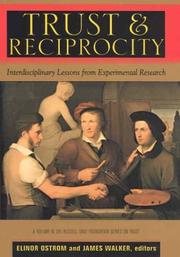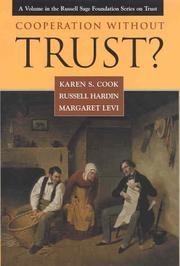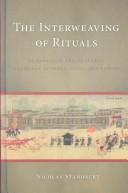| Listing 1 - 10 of 30 | << page >> |
Sort by
|
Book
ISBN: 1412349990 Year: 2006 Publisher: Chicoutimi : J.-M. Tremblay,
Abstract | Keywords | Export | Availability | Bookmark
 Loading...
Loading...Choose an application
- Reference Manager
- EndNote
- RefWorks (Direct export to RefWorks)
Book
ISBN: 1282922718 9786612922718 1442208643 9781442208643 9780742563513 0742563510 9780742563520 0742563529 Year: 2011 Publisher: Lanham Rowman & Littlefield Publishers
Abstract | Keywords | Export | Availability | Bookmark
 Loading...
Loading...Choose an application
- Reference Manager
- EndNote
- RefWorks (Direct export to RefWorks)
Social psychology. --- Sex role. --- Personality and situation. --- Social exchange. --- Symbolic interactionism. --- Social perception.
Book

ISBN: 9782354121327 2354121326 2354123256 Year: 2018 Publisher: Perpignan : Presses universitaires de Perpignan,
Abstract | Keywords | Export | Availability | Bookmark
 Loading...
Loading...Choose an application
- Reference Manager
- EndNote
- RefWorks (Direct export to RefWorks)
Transmettre, échanger : des actes, des manières de faire si quotidiens, si multiformes qu'on n'y prête guère attention. Ces processus de transmission sont omniprésents dans la société moderne (XVIe-XVIIIe siècle) où une minorité d'individus parvenaient à l'âge adulte, constamment à l'œuvre. Ils concernent autant les biens, les savoirs, les métiers, que les offices publics, l'art, et même des institutions où ils étaient en principe exclus comme à la cour souveraine de justice du Roussillon (le Conseil souverain) créée en 1660. Étudier les moyens, les stratégies employés par les individus, les familles, les groupes sociaux, pour assurer leur succession, se maintenir dans un métier ou une fonction, informe toujours beaucoup sur une société et une époque, sur les comportements, les sensibilités. Les études de cas réunies dans ce volume associent les approches d'historiens, d'historiens du droit et des institutions, d'historiens de l'Art ; portent sur le Languedoc, province intégrée depuis longtemps dans le royaume de France, et sur le Roussillon conquis beaucoup plus tard ; permettent des comparaisons suggestives, ce qui confère aux observations et aux conclusions qui peuvent en être tirées une portée plus générale.
Social institutions --- Inheritance and succession --- Social exchange --- Power (Social sciences) --- Inheritance and succession. --- Power (Social sciences). --- Social exchange. --- Social institutions. --- History --- France --- héritage --- Roussillon --- Languedoc --- succession --- histoire du droit --- échanges culturels

ISBN: 1138863475 1315029588 1136874224 9781136874222 9781315029580 9781136874369 1136874364 9781136874291 1136874291 9781138863477 0700717080 9780700717088 Year: 2003 Publisher: London New York
Abstract | Keywords | Export | Availability | Bookmark
 Loading...
Loading...Choose an application
- Reference Manager
- EndNote
- RefWorks (Direct export to RefWorks)
Covering the period from before the emergence of the first political units through to the formation of the Japanese ritsuryo state in the 8th century, this book offers a ground-breaking scholarly diachronic analysis of tsumi (offence and retribution) from a politico-historical perspective. Taking as its starting point the native forms of tsumi in the realms of myth and prayer, the study traces their development through the periods of the formation of the state and the centralization of the governing structure, to the introduction of a written-law system of governing. Through detailed and logic
Retribution. --- Social exchange --- Punishment --- Revenge --- Japan --- History --- Retribution --- J4700.10 --- Japan: Law and jurisprudence -- history -- earliest and premodern
Book
ISBN: 1282710923 9786612710926 9956616974 9956616907 9956616664 9789956616978 9789956616534 9956616532 Year: 2010 Publisher: Mankon, Bamenda [East Lansing?] Langaa Research & Publishing Distributed in N. America by Michigan State University Press
Abstract | Keywords | Export | Availability | Bookmark
 Loading...
Loading...Choose an application
- Reference Manager
- EndNote
- RefWorks (Direct export to RefWorks)
Exhumed, Tried and Hanged elucidates the abuse of folk good faith and ignorance by a conceited, ruthless and grasping leadership that sows carnage among the natives of Etambeng, culminating in unprecedented exodus, untold suffering and death of the people in neighbouring villages. Upon the death of the perpetrator the few returnees are made to listen to the gruesome stories of how the aggrieved children of his victims took revenge on his corpse.
Retribution --- Justice, Administration of --- Political violence --- Administration of justice --- Law --- Courts --- Social exchange --- Punishment --- Revenge --- Law and legislation --- Cameroonian fiction (English) --- Cameroonian literature (English)
Book
ISBN: 1443871354 9781443871358 1443866784 9781443866781 9781443866781 1443866784 Year: 2014 Publisher: Newcastle upon Tyne
Abstract | Keywords | Export | Availability | Bookmark
 Loading...
Loading...Choose an application
- Reference Manager
- EndNote
- RefWorks (Direct export to RefWorks)
In an attempt to better account for the impressive diversity of positions and relations that characterizes the eighteenth-century world, this collection proposes a new methodological frame, one that is less hierarchical in approach and more focused, instead, on the nature of these interactions, on their Addisonian ""usefulness,"" declared goals, and (un)intended results. By shifting focus from a cultural-historicist approach to sociability to the rhizomatic nature of eighteenth-century associate.
Social networks --- Social exchange --- Exchange theory (Sociology) --- Interpersonal relations --- Social interaction --- Networking, Social --- Networks, Social --- Social networking --- Social support systems --- Support systems, Social --- Cliques (Sociology) --- Microblogs --- History.

ISBN: 0871546477 9780871546487 9781610444347 1610444345 1610444345 9780871546470 0871546485 Year: 2003 Volume: v.6 Publisher: New York: Russell Sage Foundation,
Abstract | Keywords | Export | Availability | Bookmark
 Loading...
Loading...Choose an application
- Reference Manager
- EndNote
- RefWorks (Direct export to RefWorks)
Trust is essential to economic and social transactions of all kinds, from choosing a marriage partner, to taking a job, and even buying a used car. The benefits to be gained from such transactions originate in the willingness of individuals to take risks by placing trust in others to behave in cooperative and non-exploitative ways. But how do humans decide whether or not to trust someone? Using findings from evolutionary psychology, game theory, and laboratory experiments, Trust and Reciprocity examines the importance of reciprocal relationships in explaining the origins of trust and trustworthy behavior. In Part I, contributor Russell Hardin argues that before one can understand trust one must account for the conditions that make someone trustworthy. Elinor Ostrom discusses evidence that individuals achieve outcomes better than those predicted by models of game theory based on purely selfish motivations. In Part II, the book takes on the biological foundations of trust. Frans de Waal illustrates the deep evolutionary roots of trust and reciprocity with examples from the animal world, such as the way chimpanzees exchange social services like grooming and sharing. Other contributors look at the links between evolution, cognition, and behavior. Kevin McCabe examines how the human mind processes the complex commitments that reciprocal relationships require, summarizing brain imaging experiments that suggest the frontal lobe region is activated when humans try to cooperate with their fellow humans. Acknowledging the importance of game theory as a theoretical model for examining strategic relationships, in Part III the contributors tackle the question of how simple game theoretic models must be extended to explain behavior in situations involving trust and reciprocity. Reviewing a range of experimental studies, Karen Cook and Robin Cooper conclude that trust is dependent on the complex relationships between incentives and individual characteristics, and must be examined in light of the social contexts which promote or erode trust. As an example, Catherine Eckel and Rick Wilson explore how people's cues, such as facial expressions and body language, affect whether others will trust them. The divergent views in this volume are unified by the basic conviction that humans gain through the development of trusting relationships. Trust and Reciprocity advances our understanding of what makes people willing or unwilling to take the risks involved in building such relationships and why. A Volume in the Russell Sage Foundation Series on Trust
Professional ethics. Deontology --- Social psychology --- 316 --- Social interaction --- Trust --- Cooperativeness --- Social exchange --- #SBIB:309H021 --- #SBIB:303H60 --- #SBIB:032.IO --- 174 --- 301.151 --- Exchange theory (Sociology) --- Interpersonal relations --- Cooperation (Psychology) --- Trust (Psychology) --- Attitude (Psychology) --- Emotions --- Human interaction --- Interaction, Social --- Symbolic interaction --- Psychology --- Sociologie --(algemeen) --- Intra- en interpersonele communicatie --- Bijzondere methoden: algemeen --- Beroepsethiek. Deontologie --- Sociale psychologie --- 316 Sociologie --(algemeen) --- Social exchange. --- Cooperativeness. --- Trust. --- Social interaction.

ISBN: 0871541645 9781610441353 1610441354 1610441354 9780871541642 Year: 2005 Volume: 9 Publisher: New York: Russell Sage Foundation,
Abstract | Keywords | Export | Availability | Bookmark
 Loading...
Loading...Choose an application
- Reference Manager
- EndNote
- RefWorks (Direct export to RefWorks)
Social exchange --- Trust --- Cooperativeness --- Social aspects --- Cooperativeness. --- Social exchange. --- Social aspects. --- Primary groups --- Sociological theories --- Sociological theory building --- Sociology of organization --- #SBIB:324H50 --- #SBIB:35H500 --- Politieke participatie en legitimiteit (referenda, directe democratie, publieke opinie...) --- Bestuur en samenleving: algemene werken --- Exchange theory (Sociology) --- Interpersonal relations --- Social interaction --- Cooperation (Psychology) --- Social psychology --- Trust - Social aspects
Book
ISBN: 9782853997607 285399760X 2821882777 9782821882775 Year: 2010 Volume: *54 Publisher: Aix-en-Provence Publications de l'Université de Provence
Abstract | Keywords | Export | Availability | Bookmark
 Loading...
Loading...Choose an application
- Reference Manager
- EndNote
- RefWorks (Direct export to RefWorks)
« Donner, recevoir, rendre », tel est le triptyque fondamental sur lequel s’ordonnent les rapports sociaux et se constituent les hiérarchies de pouvoir selon l’analyse formulée dès les années 1920 par l’anthropologue Marcel Mauss. Cette dynamique sociale, sans être totalement remise en cause, est aujourd’hui largement interrogée tant par les anthropologues eux-mêmes que par d’autres sciences humaines qui se sont, à leur tour, emparées de cet outil de décryptage du lien social. Et si le don n’était qu’un moteur, parmi un ensemble complexe de dynamiques sociales, dont l’universalité resterait encore à démontrer ? Les réflexions menées dans cet ouvrage font de la sorte ressortir la nécessité d’aller au-delà du stade de la définition de ce que peut être le don dans les sociétés anciennes pour finalement dépasser, en l’adaptant, le concept anthropologique de l’échange réciproque.
Generosity --- Social exchange --- Générosité --- Echange social --- Congresses. --- Congresses --- Congrès --- Générosité --- Congrès --- Exchange theory (Sociology) --- Interpersonal relations --- Social interaction --- Giving --- Magnanimity --- don --- Europe --- Moyen-âge --- échange social --- Don --- Échange social --- Histoire --- Moyen âge

ISBN: 0295800046 9780295800042 029598810X 0295988231 9780295988108 9780295988238 Year: 2008 Publisher: Seattle : University of Washington Press,
Abstract | Keywords | Export | Availability | Bookmark
 Loading...
Loading...Choose an application
- Reference Manager
- EndNote
- RefWorks (Direct export to RefWorks)
Demonstrates the interweaving of Chinese and European ritual practices at different levels of interaction in seventeenth-century China. This book explores the role of rituals - specifically rites related to death and funerals - in cross-cultural exchange.
Social exchange --- Death --- Funeral rites and ceremonies --- Funerals --- Mortuary ceremonies --- Obsequies --- Manners and customs --- Rites and ceremonies --- Burial --- Cremation --- Cryomation --- Dead --- Mourning customs --- Religious aspects --- Christianity. --- China --- Religious life and customs. --- Social life and customs.
| Listing 1 - 10 of 30 | << page >> |
Sort by
|

 Search
Search Feedback
Feedback About UniCat
About UniCat  Help
Help News
News